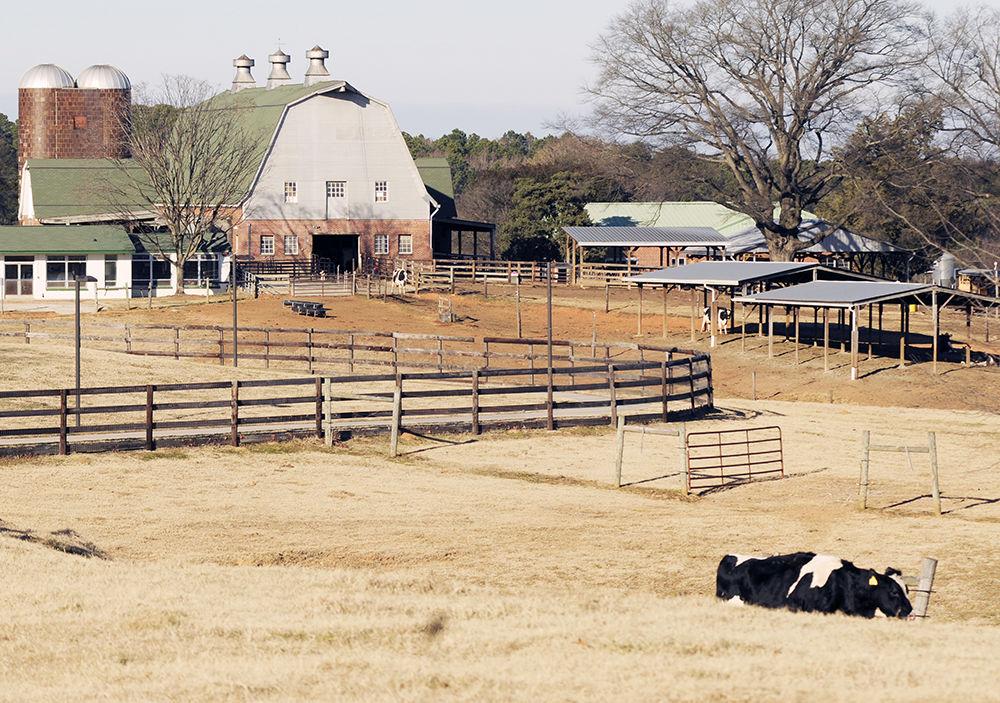NC State’s dairy industry plans to break ground on the Dairy and Food Education Center this spring, which aims to educate visitors on Howling Cow production from farm to table.
NC State’s Feldmeier Dairy Processing lab is housed in Schaub Hall, where all production for Howling Cow milk and ice cream is done. But the Dairy and Food Education Center aims to look inside the entire Howling Cow manufacturing process from beginning to end, starting on NC State’s own dairy farms.
Gary Cartwright, the director of the Dairy Enterprise System at NC State, said the education center will be a place for visitors to not only learn about how Howling Cow milk and ice cream is processed, but also how the cows on NC State dairy farms are taken care of and raised.
“The culminating component of this is to create a venue for the public to see full circle,” Cartwright said. “How does Howling Cow and milk and ice cream … get processed? What does it take to take care of your animals?”
Officially branded in 2007, Howling Cow production has benefited from the growing milk production on the farm. With nearly 300 Holstein and Jersey cows on the farm, Cartwright said NC State’s herds are consistently in the top five for milk production in the state.
“I have an incredible respect for dairy farmers the more I learn about them,” Cartwright said. “Incredibly hardworking. Total dedication to what they do. They love their animals and take care of them. It’s a story that isn’t fully understood by the public so if we can tell the public what every dairy farmer that I’ve ever met seems to do with their cows and how well they take care of them, it’s a good story for us to be telling.”
According to Cartwright, the center will contain educational videos, hands-on activities, a cafe and virtual reality experiences.
“Envision TV screens that you can walk in,” Cartwright said. “And suddenly you hit a button and you’re amongst the cows or you’re milking animals or you’re watching a calf being born. And it’s around you. We hope to not only put this experiential component in there but be very creative in how we do that.”
Along with visits from NC State students, Wake County school groups and the general public, Cartwright said they hope to receive visitors who pass the building while driving on Lake Wheeler Road, where the center will be located.
The cafe will feature Howling Cow milk, ice cream and other dairy products, but Cartwright said they are hoping to have more.
“University Dining produces their Yates Mill line of bakery goods that you can buy,” Cartwright said. “We’re hoping that University Dining will supply croissants and muffins and things like that. In that aspect, again, as people come in there, they’re going to learn about NC State.”
Another goal of the Dairy and Food Education Center is to educate the public about where the food is coming from. James Edwards, a fourth-year studying biological engineering and international studies and a former student worker on the dairy farm, said that people need to be more knowledgeable about where their food is coming from.
“I consider it to be important for people to know a little bit about where there food comes from or how it’s produced,” Edwards said. “I don’t think the average American really knows anything about that. You have a lot of big corporations producing and manufacturing food and for the majority, that’s it.”
Cartwright said that the public not only needs but also wants a place to be properly educated about food production and that a university-based center is an ideal place to learn.
“They really want to know what’s the truth about the food and where it comes from,” Cartwright said. “Today you are bombarded by information — some of it true, some of it false. People want to know what’s real and what’s fake. It’s time for something like this. The university is like neutral ground. They feel like they can come here and get real answers to their questions instead of questioning whether someone is spinning it one way or another.”
According to Edwards, NC State students and the public can benefit from learning about the connection between NC State’s farm and food production.
“For Howling Cow specifically, it’s part of NC State’s heritage,” Edwards said. “The dairy farm actually has a pretty rich history with its cows and how the farm started and where the cows came from. For people to be able to see how this university started as a land-grant university for agriculture, is still actually something that’s still relevant in the university today.”
Cartwright said that the center is planned to break ground in mid-April and that it should be complete within two years.
“The support on campus has been incredible,” Cartwright said. “It takes a lot to get these things through and we’ve aggressively pushed our concept. The good thing is, there’s something about ice cream. Butter fat provides the grease to the gears of progress.”








